Unit 2 Spring is warm. 课件(39张,内嵌音频)
文档属性
| 名称 | Unit 2 Spring is warm. 课件(39张,内嵌音频) |
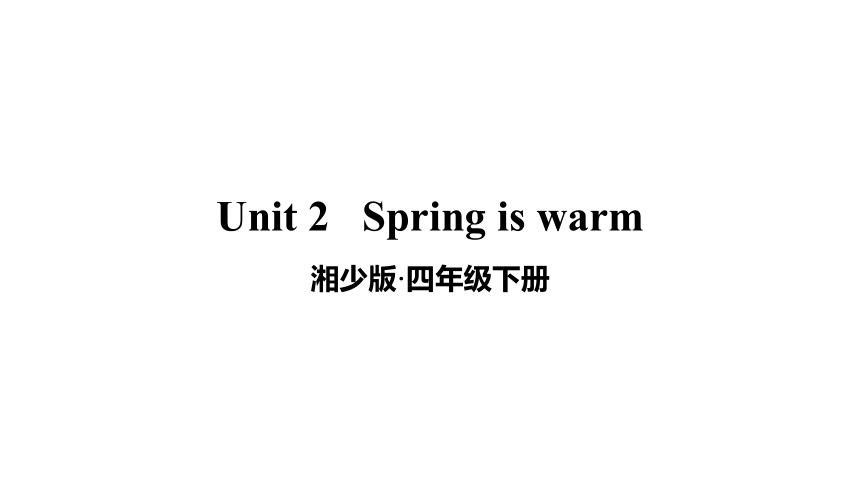
|
|
| 格式 | ppt | ||
| 文件大小 | 6.1MB | ||
| 资源类型 | 教案 | ||
| 版本资源 | 湘少版 | ||
| 科目 | 英语 | ||
| 更新时间 | 2020-06-05 10:24:05 | ||
图片预览


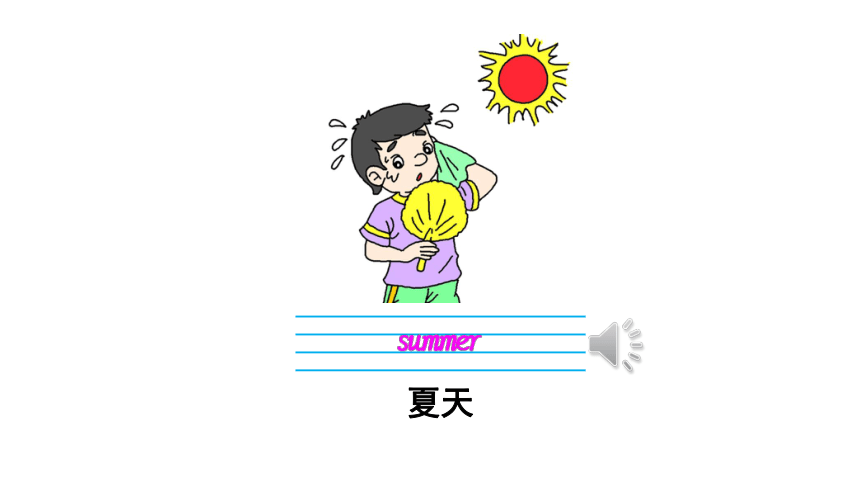
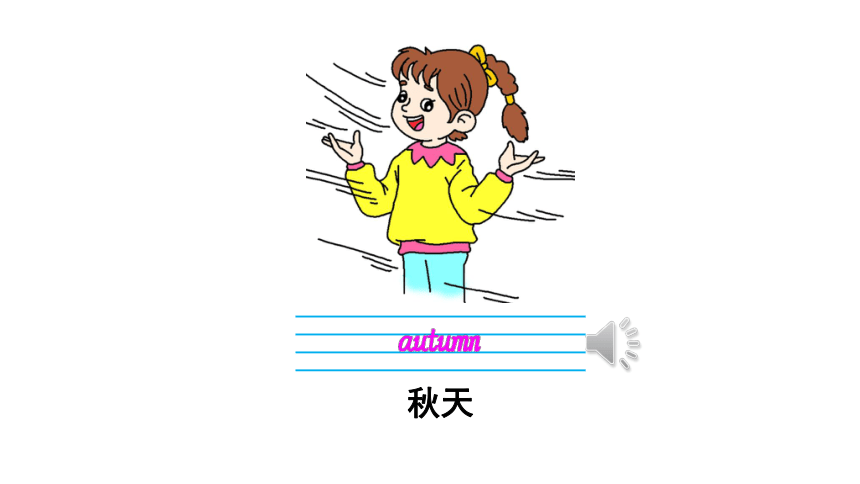
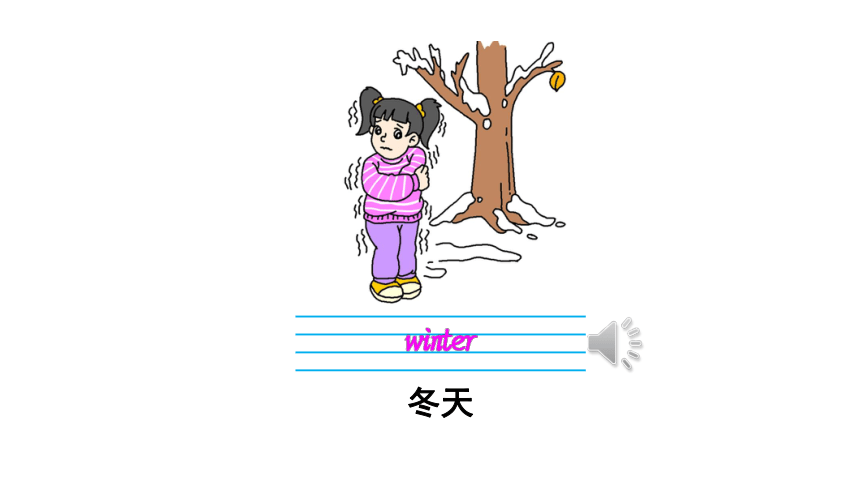
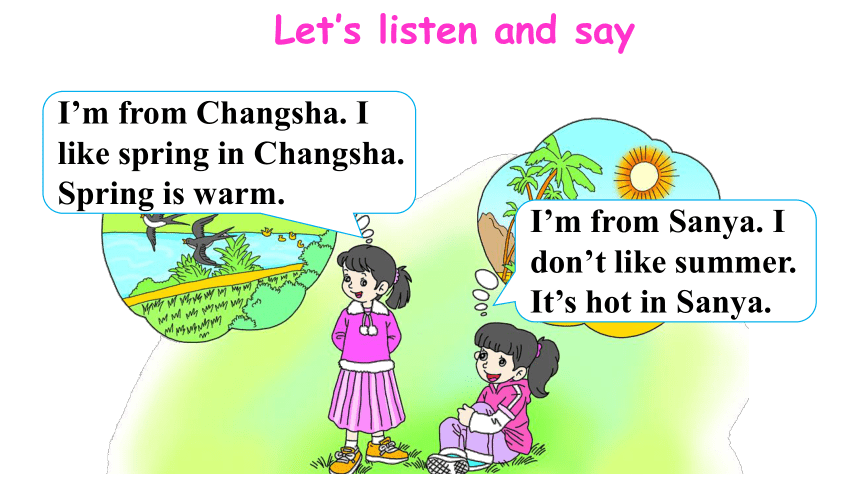
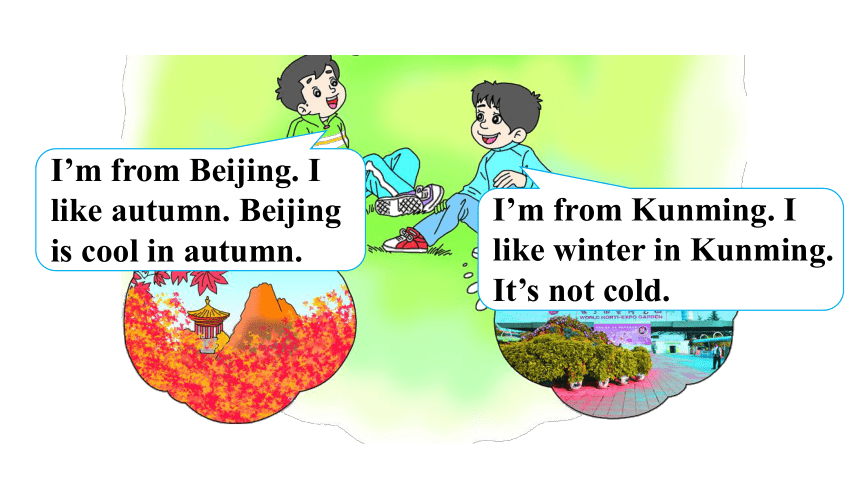

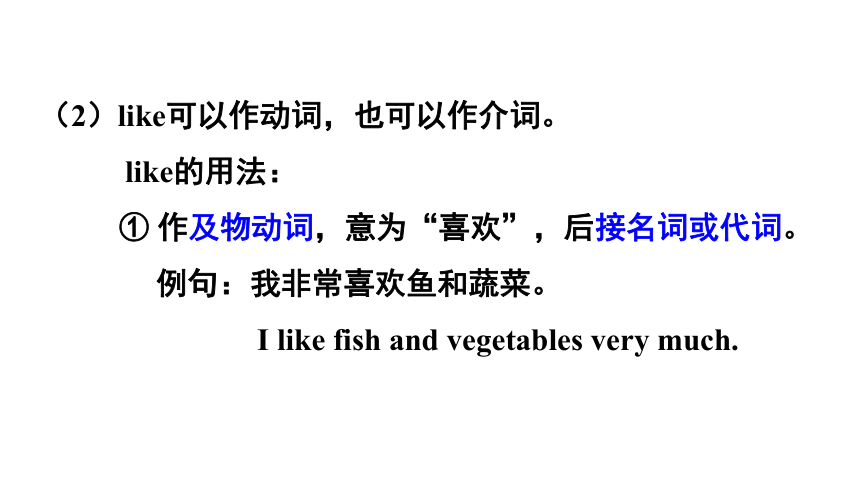
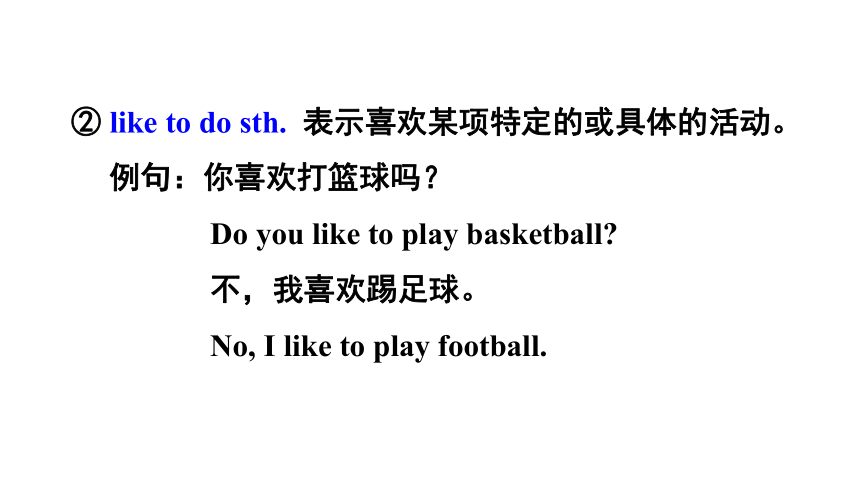
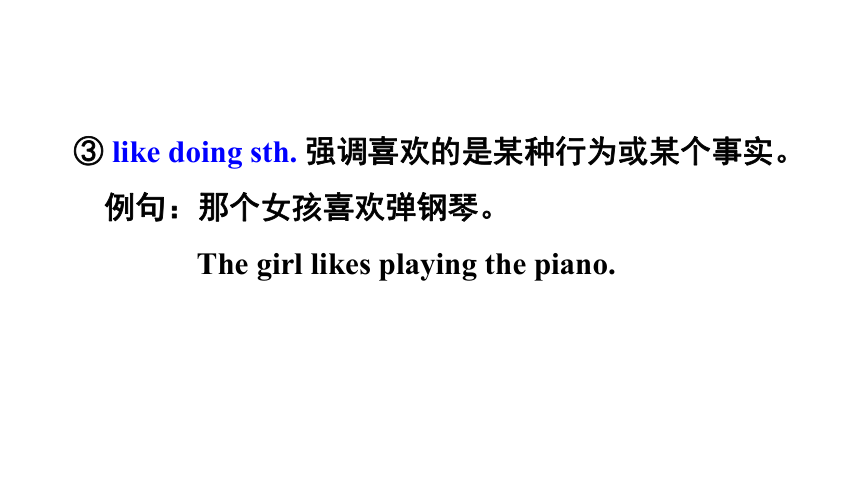
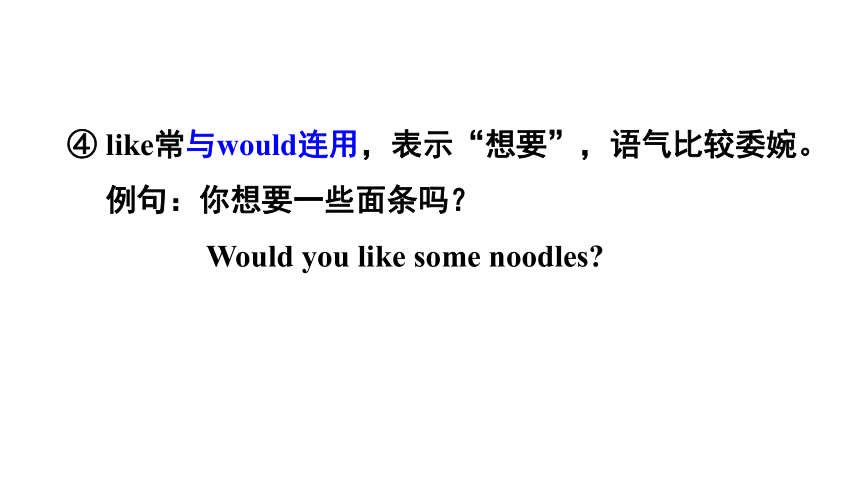
文档简介
Unit 2 Spring is warm
湘少版·四年级下册
春天
New words
夏天
秋天
冬天
I’m from Changsha. I like spring in Changsha. Spring is warm.
I’m from Sanya. I don’t like summer. It’s hot in Sanya.
Let’s listen and say
I’m from Beijing. I like autumn. Beijing is cool in autumn.
I’m from Kunming. I like winter in Kunming. It’s not cold.
Language points
1. I like spring in Changsha. 我喜欢长沙的春天。
(1)这是一个描述喜欢某地某个季节的陈述句。
句型结构:主语+like(s)+季节+in+地名.
例句:我喜欢厦门的冬天。
I like winter in Xiamen.
(2)like可以作动词,也可以作介词。
like的用法:
① 作及物动词,意为“喜欢”,后接名词或代词。
例句:我非常喜欢鱼和蔬菜。
I like fish and vegetables very much.
② like to do sth. 表示喜欢某项特定的或具体的活动。
例句:你喜欢打篮球吗?
Do you like to play basketball?
不,我喜欢踢足球。
No, I like to play football.
③ like doing sth. 强调喜欢的是某种行为或某个事实。
例句:那个女孩喜欢弹钢琴。
The girl likes playing the piano.
④ like常与would连用,表示“想要”,语气比较委婉。
例句:你想要一些面条吗?
Would you like some noodles?
⑤ “How do you like…?” 句型主要用于询问对方对
某个地方或某件事物的看法,意为“你觉得……
怎么样?”。
例句:你觉得这首歌怎么样?
How do you like this song?
⑥ like作介词时,意为“像;和……一样。”
例句:她看起来像她妈妈。
She looks like her mother.
这是一个描述某地天气状况的陈述句,代词 it 代指天气。
句型结构:It’s+表示天气的形容词+in+地点.,表示某地的天气怎么样。
例句:昆明天气温暖。
It’s warm in Kunming.
2. It’s hot in Sanya. 在三亚天气很热。
3. Beijing is cool in autumn. 在秋天,北京天气凉爽。
这是一个描述某地某个季节的天气情况的句型。
句型结构:地点+is+表示天气的形容词+in+季节.
例句:在夏天,武汉天气炎热。
Wuhan is hot in summer.
Let’s learn
warm
hot
spring
summer
温暖的
炎热的
春天
夏天
cool
cold
autumn
winter
秋天
冬天
凉爽的
寒冷的
Let’s act
What’s the weather like here?
Oh, it’s very cold!
Pair work
What’s the weather like here?
Oh, it’s hot in summer!
It’s not very cold in winter.
Language points
What’s the weather like here?这儿的天气怎么样?
这是由what引导的特殊疑问句。
询问某地的天气情况怎么样的句型结构:
What’s the weather like (in+季节/地点)?
= How’s the weather in+地点?
答语:It’s+描述天气状况的形容词.
What’s=What is; How’s=How is。
例句:海南天气怎么样?
What’s the weather like in Hainan?
=How’s the weather in Hainan?
Let’s read
It’s spring. Tim and Dino are in
the garden.
1
Summer is hot. Tim and Dino go to the beach.
2
Autumn is cool. Dino wears
Tim’s jumper.
3
Dino, no! You can’t wear my jumper.
Winter is snowy.
Be careful!
1. Winter is snowy. 冬天多雪。
snowy是形容词,意为“下雪的(多雪的)”。
例句:今天是下雪天。
It’s snowy today.
Language points
拓展:表示天气的单词巧记
天气词,真简单,名词后面把y添,除了sun多个n,
描述时前加it’s,巧妙牢记细分辨。
sun—ny—sunny wind—y—windy
cloud—y—cloudy snow—y—snowy
rain——y—rainy
2. Be careful! 小心
这是一个祈使句。在日常生活中用来提醒别人要小心、保重,一般是预先提醒或者表示关心,避免危险事情的发生等。
例句:小心!车来了。
Be careful! The bus is coming.
(1)look out 语气最强,用于某种紧急的情况或者可能
出现危险的场合。
例句:当心!车快要撞到你了。
Look out! The car will hit you.
look out, take care 与 be careful
(2)take care语气较弱,多用于对可能出现的不测
做出预先的提醒或警告。
例句:小心别打破了杯子。
Take care not to break the glass.
(3)be careful是一般的警告或劝告用语,可用于
各种情况。
例句:小心!汤很烫。
Be careful! The soup is hot.
Let’s read and write
Dear friend,
I’m Zhang Leilei. I live in Sanya. It’s very hot in summer. I like winter here. It’s not very cold. People come to Sanya in winter. I never see snow here.
Yours,
Zhang Leilei
Dear Zhang Leilei,
My name is ____________
I live in ________________
In summer, it’s__________
In winter, it’s________________
Yours,
_____________
photo of your hometown
not too cold.
Li Liang
Changsha
hot
Li Liang
Language points
I live in Sanya. 我住在三亚。
表示居住在某地时,用“live in/at+某地”,但表达居住在某岛上,需用“live on+某岛”。
例句:我祖父母住在中国西安。
My grandparents live in Xi’an, China.
It’s a bright, bright day.
A little brown bird
Stands on a branch,
To sing all day.
br
Let’s chant
Autumn leaves are falling, red and yellow and brown. Autumn leaves are falling, see them fluttering down.
Autumn Leaves
Let’s have fun
湘少版·四年级下册
春天
New words
夏天
秋天
冬天
I’m from Changsha. I like spring in Changsha. Spring is warm.
I’m from Sanya. I don’t like summer. It’s hot in Sanya.
Let’s listen and say
I’m from Beijing. I like autumn. Beijing is cool in autumn.
I’m from Kunming. I like winter in Kunming. It’s not cold.
Language points
1. I like spring in Changsha. 我喜欢长沙的春天。
(1)这是一个描述喜欢某地某个季节的陈述句。
句型结构:主语+like(s)+季节+in+地名.
例句:我喜欢厦门的冬天。
I like winter in Xiamen.
(2)like可以作动词,也可以作介词。
like的用法:
① 作及物动词,意为“喜欢”,后接名词或代词。
例句:我非常喜欢鱼和蔬菜。
I like fish and vegetables very much.
② like to do sth. 表示喜欢某项特定的或具体的活动。
例句:你喜欢打篮球吗?
Do you like to play basketball?
不,我喜欢踢足球。
No, I like to play football.
③ like doing sth. 强调喜欢的是某种行为或某个事实。
例句:那个女孩喜欢弹钢琴。
The girl likes playing the piano.
④ like常与would连用,表示“想要”,语气比较委婉。
例句:你想要一些面条吗?
Would you like some noodles?
⑤ “How do you like…?” 句型主要用于询问对方对
某个地方或某件事物的看法,意为“你觉得……
怎么样?”。
例句:你觉得这首歌怎么样?
How do you like this song?
⑥ like作介词时,意为“像;和……一样。”
例句:她看起来像她妈妈。
She looks like her mother.
这是一个描述某地天气状况的陈述句,代词 it 代指天气。
句型结构:It’s+表示天气的形容词+in+地点.,表示某地的天气怎么样。
例句:昆明天气温暖。
It’s warm in Kunming.
2. It’s hot in Sanya. 在三亚天气很热。
3. Beijing is cool in autumn. 在秋天,北京天气凉爽。
这是一个描述某地某个季节的天气情况的句型。
句型结构:地点+is+表示天气的形容词+in+季节.
例句:在夏天,武汉天气炎热。
Wuhan is hot in summer.
Let’s learn
warm
hot
spring
summer
温暖的
炎热的
春天
夏天
cool
cold
autumn
winter
秋天
冬天
凉爽的
寒冷的
Let’s act
What’s the weather like here?
Oh, it’s very cold!
Pair work
What’s the weather like here?
Oh, it’s hot in summer!
It’s not very cold in winter.
Language points
What’s the weather like here?这儿的天气怎么样?
这是由what引导的特殊疑问句。
询问某地的天气情况怎么样的句型结构:
What’s the weather like (in+季节/地点)?
= How’s the weather in+地点?
答语:It’s+描述天气状况的形容词.
What’s=What is; How’s=How is。
例句:海南天气怎么样?
What’s the weather like in Hainan?
=How’s the weather in Hainan?
Let’s read
It’s spring. Tim and Dino are in
the garden.
1
Summer is hot. Tim and Dino go to the beach.
2
Autumn is cool. Dino wears
Tim’s jumper.
3
Dino, no! You can’t wear my jumper.
Winter is snowy.
Be careful!
1. Winter is snowy. 冬天多雪。
snowy是形容词,意为“下雪的(多雪的)”。
例句:今天是下雪天。
It’s snowy today.
Language points
拓展:表示天气的单词巧记
天气词,真简单,名词后面把y添,除了sun多个n,
描述时前加it’s,巧妙牢记细分辨。
sun—ny—sunny wind—y—windy
cloud—y—cloudy snow—y—snowy
rain——y—rainy
2. Be careful! 小心
这是一个祈使句。在日常生活中用来提醒别人要小心、保重,一般是预先提醒或者表示关心,避免危险事情的发生等。
例句:小心!车来了。
Be careful! The bus is coming.
(1)look out 语气最强,用于某种紧急的情况或者可能
出现危险的场合。
例句:当心!车快要撞到你了。
Look out! The car will hit you.
look out, take care 与 be careful
(2)take care语气较弱,多用于对可能出现的不测
做出预先的提醒或警告。
例句:小心别打破了杯子。
Take care not to break the glass.
(3)be careful是一般的警告或劝告用语,可用于
各种情况。
例句:小心!汤很烫。
Be careful! The soup is hot.
Let’s read and write
Dear friend,
I’m Zhang Leilei. I live in Sanya. It’s very hot in summer. I like winter here. It’s not very cold. People come to Sanya in winter. I never see snow here.
Yours,
Zhang Leilei
Dear Zhang Leilei,
My name is ____________
I live in ________________
In summer, it’s__________
In winter, it’s________________
Yours,
_____________
photo of your hometown
not too cold.
Li Liang
Changsha
hot
Li Liang
Language points
I live in Sanya. 我住在三亚。
表示居住在某地时,用“live in/at+某地”,但表达居住在某岛上,需用“live on+某岛”。
例句:我祖父母住在中国西安。
My grandparents live in Xi’an, China.
It’s a bright, bright day.
A little brown bird
Stands on a branch,
To sing all day.
br
Let’s chant
Autumn leaves are falling, red and yellow and brown. Autumn leaves are falling, see them fluttering down.
Autumn Leaves
Let’s have fun
同课章节目录
- Unit 1 It's on your head!
- Unit 2 Spring is warm.
- Unit 3 What can you see?
- Assessment I
- Unit 4 Can you write in English?
- Unit 5 Peter is writing.
- Unit 6 What's Anne doing?
- Assessment II
- Unit 7 Today is Saturday.
- Unit 8 I come from China.
- Unit 9 How much is it?
- Assessment III
- Unit 10 He has two feet.
- Unit 11 Do you have a ticket?
- Unit 12 Do you have any money?
- Assessment IV
